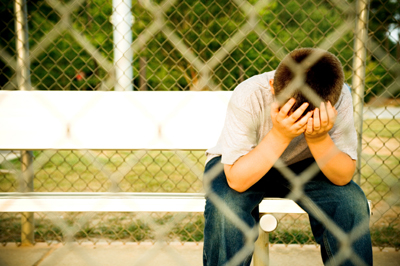Why Kids Quit Sports and How to Prevent it
Kids stop playing sports for many reasons and the contributing factors vary depending on the child, their age, personality and interests.
Research from The Children’s Society suggests that children who are regularly active have higher levels of wellbeing than those who are not.
So it’s in our interest to keep the passion for sport or physical activity alive.
That’s why we’re highlighting 6 common reasons why kids quit sports, along with some suggestions for how parents can help tackle them:
- Enjoyment
- Pressure to perform
- Lack of confidence
- Age
- Financial constraints
- Lure of technology
When do most kids quit sports?
According to Professor Dame Sally Davies, a former Chief Medical Officer for England, ‘if physical activity were a drug, we’d talk about it as a miracle cure’.
This is why curricular PE is so vital for young people – it’s statutory active time which is available to all, irrespective of factors which could affect participation at other times.
Yet, as children grow up, there is evidence to show that an increasing number of kids quit sports.
A study by the University of Bristol revealed a dramatic drop in children’s physical activity levels by the time they finish primary school.
And according to a survey by Sport England, the proportion of children and young people in England who are active has decreased by 1.9% over the past 12 months (a drop of 86,500).
So why do children fall out of love with sports? And how can parents prevent it?
6 reasons why children quit sports
Loss of enjoyment
Lack of enjoyment is the number one reason why kids quit sports.
Research by the Youth Sport Trust claims that ‘Enjoyment of PE does decline slightly as children get older.’ This can be down to sport becoming more competitive or quite simply because children develop other interests, therefore sport and physical activity becomes less enjoyable.
Any sporting opportunity should be centred around fun because fun not only keeps kids in sports but it enhances performance and personal development.
Seek out clubs which prioritise fun and creative play, particularly for younger children. It’ll help children find enjoyment in keeping physically active.

Tips:
- Encourage your child to try different sports – the more variety they experience the more likely they are to find a sport they love, for life!
- Make sport fun – seek out sports classes or clubs which are creative and focus on the process of learning rather than the results. Try not to prioritise competition over fun.
- As adults, we should role-model positive associations with sport – show your children that sport is an important part of your routine.
- Participate in active family games or activities – book family swim sessions, have a game of crazy golf or head to the park for a game of frisbee. Prioritising active family time and demonstrating the fun in it will keep kids engaged for longer.
- Reiterate that the enjoyment of sport comes from hard work, skills development and doing something social and active.
Pressure to perform
As children get older they are exposed to an increasing amount of competitive sport, often in the form of competitive matches.
Team sports come with many important benefits such as improved communication, teamwork, coping with winning and losing, and the development of leadership skills. However, if your child dislikes competition they won’t find sports fun. They will feel disengaged, may stop getting selected for teams and therefore experience apathy towards sport.

On the other hand, kids who have a passion to perform at the highest possible level can experience too much pressure as they’re regularly competing against equally high-achieving athletes. They can berate themselves when a result doesn’t go their way or may burden themselves with disappointment, which can be hard for a child to process, especially at a young age.
Tips:
- Don’t over-pressure kids or expect too much. Be mindful of your expectations and try not to overload them with too much pressure as this can lead to anxiety and will quash enjoyment.
- Help kids cope with pressure. It can be helpful to reframe nerves as excitement.
- Success takes many forms! Praise values other than winning such as effort, kindness, hard work, teamwork or progress.
- For young athletes or those competing at an elite level, be mindful that training, participation and progress all play a big part in success.
- Winning and losing are part of life – both have to be experienced and accepted.
- Self-conscious kids might worry about letting down their parents, coaches or teammates. Let your child know the goal is to be fit and have fun.
Lack of confidence
Sport England’s Uniting The Movement report claims that “Positive experiences at an early age help build the foundations for an active life. If children and young people have experiences that feel fun, positive and give them a sense of confidence, they’re more likely to want to be active in the future.”
Premier Education franchisee, Michael Brennan, echoes this view:
“If kids haven’t mastered the basics in KS1 they may struggle at KS2. PE can have a lasting impact on a child’s love of sport, their physical competency and overall attitude to health and wellbeing. Setting children up at KS1 with robust skills and understanding will help them thrive in KS2 and into high school when PE becomes more technical. These basics will stand kids in great stead as they progress.”
There is a propensity towards raising ‘successful kids’ rather than praising or nurturing progress, participation and development. Not winning can knock a child’s confidence, as can not getting picked for a team.
What’s needed is a good developmental environment to encourage children to participate and feel included.
Tips:
- Chat with teachers and coaches about how they boost confidence in pupils. How are children being motivated and inspired in curricular PE or extracurricular clubs, particularly if they’re not naturally sporty?
- Kids should be encouraged to participate in lots of different sports from a young age. The exposure – and mixing with lots of different children – will naturally boost their confidence.
- If your child likes to play sports with a local club, make sure the club focuses on inclusivity.
- Sign your child up to extracurricular clubs at school to give them an opportunity to develop confidence in a familiar environment. Encourage them to sign up with a group of their friends as they’re more likely to want to return.
PE measurement tools, like Wow Active are designed to be a great way for kids to take more accountability of their own progress in PE lessons. Recommend it to your school if you think it will help to improve sporting engagement and participation.

Changing interests
As children get older they encounter more pressures – extracurricular commitments, homework, desire to spend time with friends, or exams.
Also, older kids spend more time playing competitive sports which aren’t to everyone’s taste.
If children don’t have a good PE grounding they will feel increasingly alienated or unable to compete.
If sport becomes more competitive and less about fun as kids get older, the less enjoyment they will get from it.
Also, research suggests that participation in sports is related to adolescent growth and development. Factors such as puberty and level of maturity will impact feelings of self-awareness and self-consciousness. Some kids quit sport because they don’t want to sweat or exert themselves in front of the opposite sex, especially in high school.
Tips:
- Establish an active routine from an early age. It will be harder to quit sports if sport has become a habit.
- As a parent, talk to children about the benefits of living a healthy, physically active life. Quitting sports can affect their health and wellbeing.
- If you can, take your child to spectate at organised sports fixtures to see others in action. It might be the inspiration they need!
- Whatever your kids ages, prioritise family time spent going for a walk or bike ride.
- Seek out girls or boys only sports clubs if your child doesn’t want to compete against members of the opposite sex.

Financial constraints
There is a view that competitive sport comes with a cost.
Whether it’s equipment, coaching, training, tournaments or transportation, sporting participation requires a certain financial (and time!) commitment from parents.
As a result, not everyone can enjoy the luxury of playing sports outside school. This can inadvertently demote the importance of sport in the child’s eyes. Or their lack of participation can fuel their desire to stop altogether.
Tips:
- Seek out free or taster days to give your child an opportunity to try something new without cost or commitment.
- Many extracurricular clubs are school funded, to encourage wider participation across the school community.
- Invest in low-cost items such as a frisbee, football or rounders bat and take the children to the part for fun family active time together.
- Find local community teams or activities where financial barriers are lower
Lure of technology
As children grow up, their proximity to technology increases. They may start using a mobile phone, have access to a computer or tablet to complete homework or use devices as a means to communicate or play games with friends.
Some academic studies have linked the rise in screen time to a lack of physical activity in children. While it can be enticing for children to spend time online over participating in sports clubs, a parent should be mindful of device use and manage accordingly.
Tips
- Start incorporating sport into your child’s routine from an early age. Whether it’s extra-curricular classes or long family bike rides at weekends.
- Embrace the technology – if your kids have completed a move or challenge on a computer game (scoring a winning goal or running through an imaginary world!), ask them to reenact it in real life afterwards.
- When it’s time to take a screen break, have another activity lined up – preferably an active one!

Whatever the reason, parents can help
From youth athletes to recreational participants, kids quit sports for many different reasons.
Whether it’s because they don’t like to play sports, they don’t find it fun anymore, or they feel pressured to perform, parents should get to the root cause of the sporting apathy and suggest ways to keep physical activity in their child’s life.
Quitting sports may feel disappointing, but not every kid will become an athlete. If they quit sports yet embrace other things like walking or cycling to school, they are still keeping active, which will keep them healthy in the long run!

